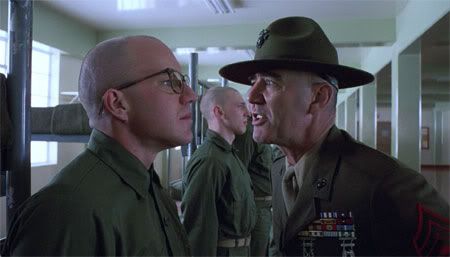
The major networks – CBS, NBC and ABC in this country – seem to have cornered the market on procedurals. In fact, it could be argued that procedurals are overrated. However, occasionally a show will try to take the procedural formula and go in a different direction. Take a cop show, for example, and give it military trappings. Or take a medical show and make the principle an insufferable douchebag. And then you have some of the shows on USA, which look at procedurals from an entirely different perspective – I’m taking a long, lingering look at you, Burn Notice. Come back soon.
Anyway, what we have here is a show that deals with major crimes – multi-million dollar art forgeries etc. Law & Order Criminal Intent does this with the typical Law & Order tropes. That is to say, everything’s very serious, the subjects are RIPPED FROM THE HEADLINES and nobody cracks a smile. It leans so heavily on the non-comedic side of drama it occasionally makes Greek tragedies look light-hearted.
On the other side of things, we have White Collar.
This isn’t to say that White Collar is madcap or slapstick. It’s not playing things deliberately for laughs. It is, however, intelligently written and well-paced. The premise of a gentleman thief coming over to the lawful side of things in order to secure their freedom isn’t really new, but one of the things that makes White Collar stand out is that the two leads are equally intelligent and even before their partnership begins, there’s a grudging admiration for each other. It’s like if Al Pacino & Robert DeNiro’s characters in Heat came up against a more violent gang of bank robbers and joined forces to take them down.
Neal Caffery, as a character, is especially interesting because he does use his intelligence and charm to get what he wants, yet isn’t willing to use violence to achieve his ends, nor is he completely happy-go-lucky. He does have desires that extend beyond creature comforts and fine clothing. The fact that Matt Bomer’s so easy on the eyes puts the whole character together in a shiny package that’s very, very difficult to ignore.
Tim DeKay’s FBI Agent Peter Burke isn’t a slouch either. He’s just as smart as Neal, being the only person ever to catch Neal after years of chasing him down. His suspicion isn’t completely unfounded, yet he respects and even likes Neal, especially because Neal is smart enough not to do something stupid that would blow a case on which they’re working.
For example, instead of just going through a plan by the seat of his pants, Neal is seen studying a book on warrant law before heading into the lion’s den of a particularly nasty art forger. Since Neal is wearing a GPS ankle bracelet that goes off if he leaves a 2-mile radius within New York City, the FBI is informed he’s flown the coup. When Burke and his men arrive, they see he’s come to the suspicious warehouse the two visited earlier for which Burke did not have enough evidence to secure a warrant. Since they are in the course of apprehending a fugitive, the FBI can execute a search legally, and they nab the bad guys by the book. They couldn’t have done it without Neal, and when Burke sees where Neal has brought him, he grins.
It’s up there with Burn Notice in terms of enjoyability, writing and character writing. Let’s hope it stays at this level. My wife, one of the most critical people I know, has dubbed it “fuckawesome.”
I couldn’t agree more.






